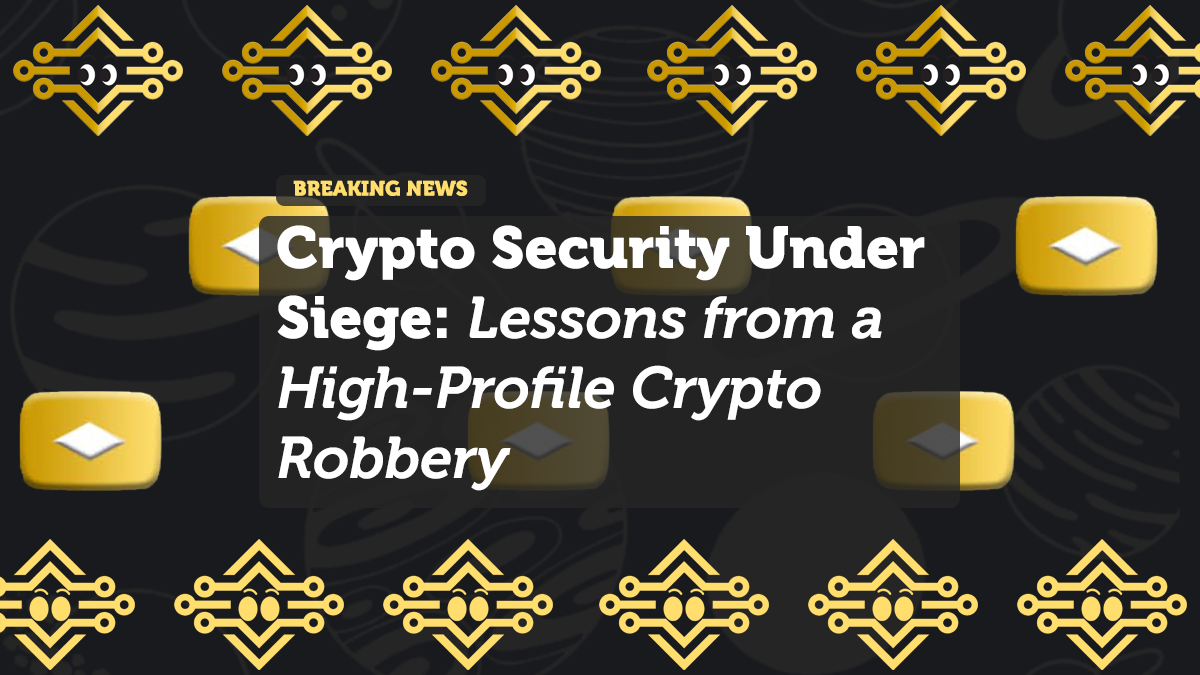
Crypto Security Under Siege: Lessons from a High-Profile Crypto Robbery
Crypto security is once again in the spotlight after a well-known streamer lost millions in a high-profile cryptocurrency theft. This incident serves as a stark reminder that even experienced investors remain vulnerable to cyberattacks, hacks, and social engineering schemes.
Key Takeaways:
A popular streamer’s crypto wallet was drained of millions, highlighting security gaps.
Hackers exploited weaknesses in private key storage and personal security.
The theft underscores the urgent need for better security measures for digital assets.
How did this happen, and what can crypto holders do to prevent similar losses? Let’s break it down.
What Happened? The Crypto Robbery Breakdown
The Incident: A well-known Twitch/YouTube streamer (name withheld for privacy) recently lost an estimated $3.2 million in cryptocurrency when hackers gained unauthorized access to their private wallet.
How It Happened:
✔ Compromised Private Keys: The attacker accessed the streamer’s wallet through leaked seed phrases.
✔ Social Engineering Attack: Phishing links and possible SIM swap attacks were involved.
✔ Lack of Cold Storage: Funds were stored in a hot wallet, making them easier to steal.
“Another day, another crypto theft. If you’re storing millions in a hot wallet, you’re asking for trouble.”
This theft highlights how even tech-savvy individuals can fall victim to sophisticated attacks.
Key Security Vulnerabilities Exposed
1. Poor Private Key Management
❌ Many users store seed phrases in plaintext (on computers, cloud storage, or even screenshots).
❌ If a hacker gains access to your device, they can extract and use your keys instantly.
✔ Solution: Store private keys offline in a secure hardware wallet or metal backup.
“Your seed phrase should NEVER be online. Write it down and store it safely—preferably in multiple secure locations.”
2. Social Engineering & Phishing Attacks
❌ Hackers trick users into revealing credentials via fake emails or malicious links.
❌ Even influencers and experienced traders have fallen for well-crafted scams.
✔ Solution: Enable two-factor authentication (2FA) and verify every website or message before clicking.
“Double-check URLs, avoid clicking random links, and NEVER share your private keys.”
3. Relying on Hot Wallets for Large Holdings
❌ Hot wallets (connected to the internet) are convenient but vulnerable to hacks.
❌ Once funds are stolen, recovery is nearly impossible.
✔ Solution: Use cold wallets (hardware wallets like Ledger, Trezor) for long-term storage.
“Keep your spending funds in a hot wallet, but store the bulk of your crypto in cold storage.”
How to Protect Your Crypto: Best Security Practices
1. Use Hardware Wallets
✔ Cold wallets like Ledger, Trezor, or Keystone keep your keys offline.
✔ Only connect them when making transactions.
✔ Never store large sums in exchange wallets or mobile apps.
2. Enable Multi-Signature (Multi-Sig) Security
✔ Multi-sig wallets require multiple approvals for withdrawals, adding extra security.
✔ Useful for businesses, DAOs, and high-value investors.
3. Set Up Strong Two-Factor Authentication (2FA)
✔ Use hardware-based 2FA (e.g., YubiKey) instead of SMS (vulnerable to SIM swaps).
✔ Enable 2FA on all exchange and wallet accounts.
4. Be Wary of Phishing & Social Engineering
✔ Double-check email senders and website domains.
✔ Avoid downloading attachments from unknown sources.
✔ Never share your private keys or seed phrases—EVER.
“If someone asks for your seed phrase, they’re trying to scam you. Full stop.”
Crypto Theft Recovery: Can Stolen Funds Be Recovered?
The harsh reality: Crypto transactions are irreversible.
Most stolen assets are moved through mixers (e.g., Tornado Cash) to obscure trails.
What Can You Do If You’re Hacked?
✔ Report the theft immediately to exchanges, blockchain forensic firms, and authorities.
✔ Use blockchain tracking services (e.g., Chainalysis, TRM Labs) to monitor stolen funds.
✔ Freeze assets if they’re on centralized exchanges (if reported quickly enough).
“Tracking stolen funds is possible, but recovering them is another story. Prevention is the best defense.”
Once crypto is stolen, getting it back is extremely difficult. Secure your assets before it’s too late.
Final Thoughts: The Importance of Crypto Security
Key Lessons from the Streamer’s Crypto Theft:
✔ Never store private keys online or on your phone.
✔ Use hardware wallets and multi-sig for long-term holdings.
✔ Always verify links, emails, and login requests to avoid phishing scams.
✔ Act fast if hacked—report incidents immediately.
Crypto security is YOUR responsibility. If you lose your keys, you lose your funds.
What’s Your Take?
Have you or someone you know experienced a crypto scam? Drop your thoughts and security tips below!
















